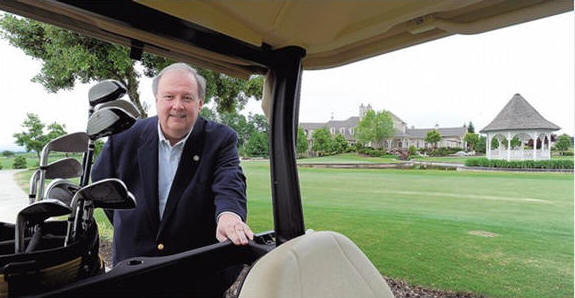A federal jury has found that millions of dollars in damages should be awarded to a former business partner of Maryville developer Mike Ross.
The lawsuit was filed in 2009 by Robert Stooksbury, who had partnered with Ross on the Rarity Pointe residential community, and was heard in federal court last week.
According to a verdict form, the jury found that more than $3.5 million in compensatory damages flow from violations of federal law, while $11.3 million in compensatory damages should be awarded for violations of state law.
Stooksbury, Ross and Ward Whelchel were partners in the project, but Stooksbury's suit had accused Ross and other defendants of engaging in racketeering activity.
Among other things, the suit alleged that the defendants diverted large portions of the capital from Rarity Pointe and other projects for their personal use, a charge Ross has denied.
Last month, U.S. District Judge Thomas Varlan issued a default judgment in the case, saying that despite two orders of the court, Ross and other defendants failed to produce unobjectionable final and complete responses to discovery requests. This month's trial was for the purpose of assessing damages.
The trial's second phase, focusing on punitive damages, is expected to begin today.
During the trial Stooksbury's attorney, Wayne Ritchie, had solicited expert testimony alleging the plaintiff suffered losses because of factors including discounted lot sales and increased club membership fees.
In closing arguments last week, Ross attorney Mike Meares sought to downplay those allegations, saying no one had proved the membership fees were too high or were improper and questioning the allegation that lots were sold for less than their value. He also questioned why Whelchel was not a participant in the suit.
He told the jury to use its common sense, and said Stooksbury was on the selling end of the project, not the buying end. "If somebody got taken advantage of, it wasn't this man," he said, pointing to the plaintiff.
In his own closing argument, Ritchie said Ross and other defendants were not taking responsibility for the "financial destruction" they caused. He said the membership fees were supposed to be used to build amenities, and were taken off the top of lot sales.
Ritchie said the losses outlined by expert witness Jimmy Rodefer were "uncontroverted" and said the defendants could have brought in their own accountant to dispute the figures. As for Whelchel, Ritchie indicated that if the attorney had been helpful to the defense case, he would have been brought in to testify.
Referring to Ross and the other defendants, Ritchie said "They chose to do business this way and it's wrong."
In an interview on Tuesday, Ritchie said Stooksbury "appreciates the hard work of the court and jury", but said he couldn't comment further because of the next phase of the trial.
Meares could not be reached for comment late Tuesday.
